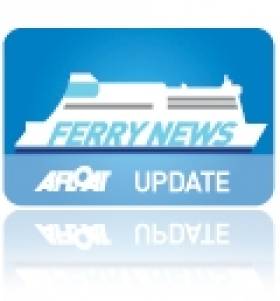Displaying items by tag: New Ireland Continent Route
Stena Line Start Direct Ferry Route From Ireland To France
#NewStenaRoute - Following the recent acquisition of Rosslare-Cherbourg ferry service from Celtic Link Ferries by Stena Line, the ferry company has started operating the service under its ownership from the start of April.
The first round-trip sailing between Ireland and France was completed today and this marks a historic milestone for Stena Line as it represents the company's first direct ferry link between Ireland and the Continent.
The new Stena Line route will operate an all year round service with 3 weekly sailings from Rosslare and Cherbourg accommodating up to 1 000 passengers, 200 cars and 120 freight units per sailing.
Richard Horswill, Stena Line's Head of Freight UK and Ireland said: "Whilst today is an historic day for Stena Line it's also a very exciting one as we integrate an important economic and leisure connection from Ireland to the Continent into our business. We believe the timing is opportune for this development as improving economic data in Ireland and Europe points to the potential for increased traffic on this important commercial link between both regions.
Richard added: "As one of the leading ferry companies in the world, we believe we can help the Rosslare-Cherbourg route realise its full potential by bringing our experience, business practices and customer service standards to the service. Since the announcement of the acquisition in late February our teams have been busy integrating the new service into Stena Line's day to day business operations and I am delighted that we are in a position to officially operate the service."
Stena Line will operate the 28,000 tonne ro-pax Celtic Horizon, soon to be renamed Stena Horizon on the route offering 3 weekly sailings from Rosslare at 21.30 on Tuesday and Thursday with a Saturday sailing at 16.00.
From Cherbourg the schedule is 21.00 on Wednesday and Friday with a Sunday sailing at 16.00 with a journey time of approximately 17 hrs.
John Lynch, General Manager Rosslare Europort commented: "We are delighted to have a company of the size and experience of Stena Line take over the Rosslare-Cherbourg service. They have an enviable reputation in the ferry industry for developing business opportunities across their freight and leisure travel business and we are looking forward to working with them to help develop the route in the months and years ahead".
He added, "There has been a lot of positive feedback from customers of the port since Stena Line confirmed it was acquiring the route and there is a sense of collective relief that the future of the route has now been safeguarded in the hands of a highly respected global ferry business."
























































